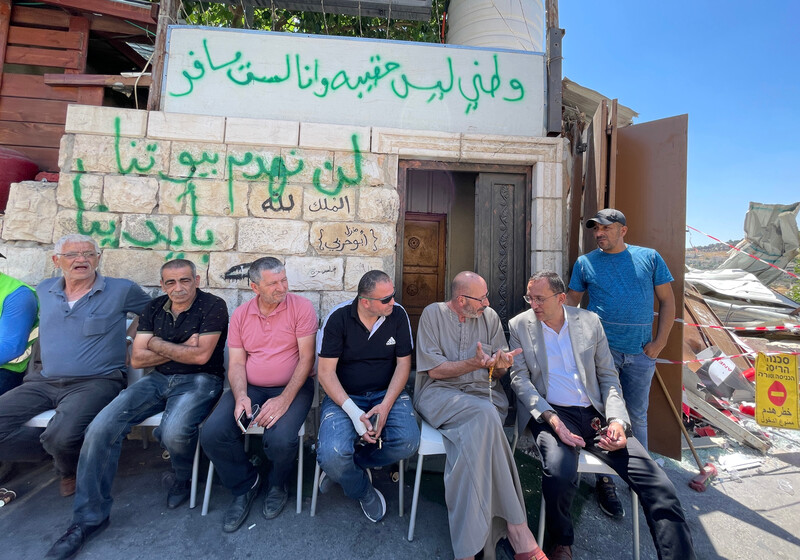Why Israel is trying to steal Silwan from Palestinians
 Saturday, August 28, 2021 at 09:59PM
Saturday, August 28, 2021 at 09:59PM https://electronicintifada.net/blogs/tamara-nassar/why-israel-trying-steal-silwan-palestinians
by Tamara Nassar. 12 July 2021 The Electronic Intifada

Palestinians sit next to the rubble of a butcher shop demolished by Israeli authorities in the occupied East Jerusalem neighborhood of Silwan on 29 June. Baraah Abo Ramouz/APA images
Israeli troops demolished a butcher shop in Silwan and a home in the Ras al-Amoud neighborhood on 29 June.
The bulldozers made two boys and their parents homeless and destroyed the income sources of nine people.
This attack on Palestinian families, their homes and livelihoods is part of Israel’s violent colonization of occupied East Jerusalem, particularly the Silwan neighborhood.
When Palestinians in the area protested the demolitions, occupation forces attacked them with tear gas and rubber-coated steel bullets, injuring at least 19 and detaining nine.
Israel has intensified its colonization in Silwan in recent weeks – but methodical conquest of the neighborhood goes back decades.
The Israeli-controlled Jerusalem municipality announced in 2005 that it intended to demolish 88 Palestinian homes in Silwan’s al-Bustan quarter and began issuing demolition orders.
Occupation authorities plan to build a park in al-Bustan named “The King’s Garden” – a reference to the biblical character King David.
The project is linked to the “City of David,” a pseudo-archaeological theme park run by settlers built nearby on land also stolen from Palestinians.
As the local Palestinian group Grassroots Al-Quds states, “The King’s Garden” – like the “City of David” – is just a pretext for “bolstering Jewish presence and expelling the Palestinian population.”
Following the demolition orders, Palestinians launched legal actions, which led to the occupation municipality filing a new plan in 2010, according to Palestinian human rights group Al-Haq.
According to that plan, 22 structures would be demolished in order to build the park, while 66 would receive “retroactive approval along with increased building rights,” according to Al-Haq.
In many cases, there was a demolition freeze on certain buildings. But that did not stop Israel demolishing and seizing Palestinian property.
Between 2004 and 2018, according to Al-Haq, occupation authorities carried out 98 demolitions in Silwan, forcibly displacing 180 Palestinians.
Since 2018, Israel has accelerated its destruction. In 2019 alone, Israel forcibly displaced 69 Palestinians in Silwan. This came amid a surge in Israeli demolitions and forced displacement of Palestinians across Jerusalem.
A particularly cruel aspect of Israel’s policy is that in some cases it forces Palestinians to demolish their own homes built on their own land.
“Refusing to self-demolish a home has devastating consequences on Palestinian owners: They are forced to pay very heavy fines, and may serve prison sentences, in addition to losing their homes,” Al-Haq states.
Earlier this year, Israel’s occupation municipality in Jerusalem refused to extend its freeze on demolition orders, according to Ir Amim, an Israeli group that monitors settlement activity in Jerusalem.
That means 20 more Palestinian-owned buildings are under imminent threat of Israeli destruction.
On 7 June, Israeli authorities gave notice that they would demolish two structures within three weeks. The butcher shop destroyed on 29 June, owned by Nidal Rajabi, was one of them.
Another 48 buildings are currently protected by a court order, but that expires in mid-August, which means a wave of demolitions could quickly follow.
Hand in glove with settler groups
Silwan consists of many smaller neighborhoods, some that Israel has designated as “open areas” or “green areas,” a pretext to prevent Palestinians from building on their own land.
Building permits, which are already notoriously difficult for Palestinians to obtain from occupation authorities, become nearly impossible to get in so-called green areas.
This forces Palestinians to build on their own land without Israeli permits and then live in constant fear that occupation forces will seize or destroy their property.
Israel has a number of other “legal” ways of forcing Palestinians off their property. They include confiscating property for “public needs” – which can include building settlements.
Another major one is legal subterfuge by settlers groups, who file claims using incomplete or false information.
This has resulted in Palestinian property being designated as “absentee property,” which is then declared state land. The state then leases this property over to the settlers.
Why Silwan?
Israel’s long-term goal is to erase Jerusalem’s Palestinian, Arab, Christian and Muslim history and remake and rewrite Jerusalem’s past and present as predominantly or exclusively Jewish.
To achieve this, the Israeli government works hand in glove with settler organizations using bureaucratic processes designed to obscure the political and colonial motives of the operation and portray matters as merely disputes over real estate or city planning.
The ultimate goal is to drive as many Palestinians out of the city as possible, changing the demographics to a Jewish majority.
This is a direct violation of international law, though Israel has of course escaped any accountability.
The UN Security Council has declared many times, for example in its resolution 476 of 1980, that all Israeli measures “which have altered the geographic, demographic and historical character and status of the Holy City of Jerusalem are null and void and must be rescinded.”
Silwan’s strategic location makes the neighborhood a prime target for Israeli colonization.
It sits just outside Jerusalem’s walled Old City and is nicknamed the “southern safeguard of al-Aqsa mosque.”
Its approximately 60,000 Palestinian residents include Silwan natives as well as Palestinians who were displaced during the Nakba, the ethnic cleansing of Palestine by Zionist militias before and after Israel was created in 1948.
Already, large swathes of land belonging to Silwan residents were stolen by Israel for its Maaleh Adumim mega-settlement east of Jerusalem.
Now, residents of Silwan are resisting Israel’s efforts to take much of what they have left.
Ali Abunimah contributed reporting.
***************************************************************************************
 APJP |
APJP |  Post a Comment |
Post a Comment |